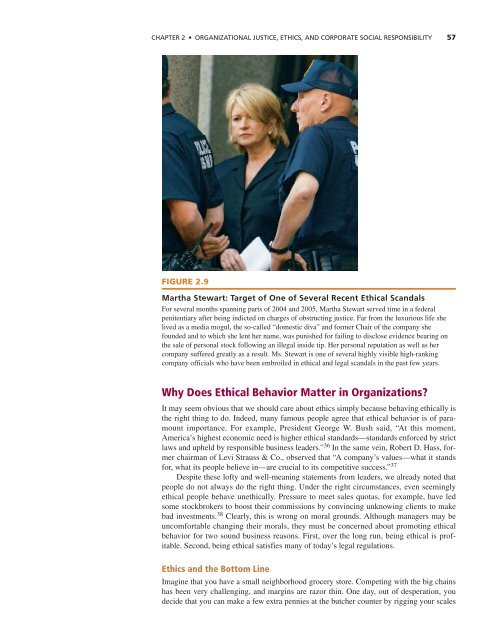Organizational Justice, Ethics, and Corporate Social Responsibility
Organizational Justice, Ethics, and Corporate Social Responsibility
Organizational Justice, Ethics, and Corporate Social Responsibility
You also want an ePaper? Increase the reach of your titles
YUMPU automatically turns print PDFs into web optimized ePapers that Google loves.
CHAPTER 2 • ORGANIZATIONAL JUSTICE, ETHICS, AND CORPORATE SOCIAL RESPONSIBILITY 57<br />
FIGURE 2.9<br />
Martha Stewart: Target of One of Several Recent Ethical Sc<strong>and</strong>als<br />
For several months spanning parts of 2004 <strong>and</strong> 2005, Martha Stewart served time in a federal<br />
penitentiary after being indicted on charges of obstructing justice. Far from the luxurious life she<br />
lived as a media mogul, the so-called “domestic diva” <strong>and</strong> former Chair of the company she<br />
founded <strong>and</strong> to which she lent her name, was punished for failing to disclose evidence bearing on<br />
the sale of personal stock following an illegal inside tip. Her personal reputation as well as her<br />
company suffered greatly as a result. Ms. Stewart is one of several highly visible high-ranking<br />
company officials who have been embroiled in ethical <strong>and</strong> legal sc<strong>and</strong>als in the past few years.<br />
Why Does Ethical Behavior Matter in Organizations?<br />
It may seem obvious that we should care about ethics simply because behaving ethically is<br />
the right thing to do. Indeed, many famous people agree that ethical behavior is of paramount<br />
importance. For example, President George W. Bush said, “At this moment,<br />
America’s highest economic need is higher ethical st<strong>and</strong>ards—st<strong>and</strong>ards enforced by strict<br />
laws <strong>and</strong> upheld by responsible business leaders.” 36 In the same vein, Robert D. Hass, former<br />
chairman of Levi Strauss & Co., observed that “A company’s values—what it st<strong>and</strong>s<br />
for, what its people believe in—are crucial to its competitive success.” 37<br />
Despite these lofty <strong>and</strong> well-meaning statements from leaders, we already noted that<br />
people do not always do the right thing. Under the right circumstances, even seemingly<br />
ethical people behave unethically. Pressure to meet sales quotas, for example, have led<br />
some stockbrokers to boost their commissions by convincing unknowing clients to make<br />
bad investments. 38 Clearly, this is wrong on moral grounds. Although managers may be<br />
uncomfortable changing their morals, they must be concerned about promoting ethical<br />
behavior for two sound business reasons. First, over the long run, being ethical is profitable.<br />
Second, being ethical satisfies many of today’s legal regulations.<br />
<strong>Ethics</strong> <strong>and</strong> the Bottom Line<br />
Imagine that you have a small neighborhood grocery store. Competing with the big chains<br />
has been very challenging, <strong>and</strong> margins are razor thin. One day, out of desperation, you<br />
decide that you can make a few extra pennies at the butcher counter by rigging your scales

















